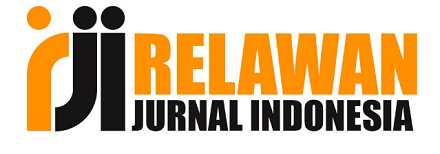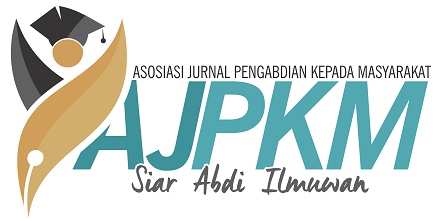Pengasuhan orang tua anak usia dini di era disrupsi
DOI:
https://doi.org/10.33474/jipemas.v4i1.7236Keywords:
parenting parents, early childhood, disruption eraAbstract
Advances in technology and the times are increasingly global, require parents to adapt quickly to the changing times. The childcare has traditionally had started at the left along with the era of increasingly apparent disruption in sight. Parenting training objectives early childhood in an era of disruption is a response from the busyness of parents in making a living, rapid advances in technology, the rise of gadgets, social media, youtube, online games, and negative news. Training delivery methods using lectures, discussions and brainstorming group. Training processes with the assessment phase, the implementation phase, and the phase of assessment and evaluation phase. Training results illustrate that parents have started to realize the education of children in the age of disruption, the use of technology-based smart parenting, immune selfer, character education and religious values in accordance with the teachings of the Prophet. Parents educate children to have manners, polite, obedient worship, and establish good relationships with others, as well as parents provide love, security, smart in dealing with the times.References
Afrianto. (2018). Being a professional teacher in the era of industrial revolution 4.0: opportunities, challenges and strategies for innovative classroom practices. English Language Teaching and Research, 2(1), 3. http://ejournal.unp.ac.id/index.php/eltar/article/view/102675
Al-Ayouby, M. H. (2017). Dampak Penggunaan Gadget Pada Anak Usia Dini. Universitas Lampung.
Anisah, A. S. (2011). Pola Asuh Orang Tua dan Implikasinya Terhadap Pembentukan Karakter Anak. Jurnal Pendidikan UNIGA, 5(1), 70–84. https://journal.uniga.ac.id/index.php/JP/article/view/43
Arikunto, S. (2014). Evaluasi Program Pendidikan. PT Bumi Aksara.
Aynur, R. N. (2019). 6 Pekerjaan Baru di Era Digital, Cocok Buat Milenial - Hot Liputan6.com.
Baharun, H., & Finori, F. D. (2019). Smart Techno Parenting: Alternatif Pendidikan Anak Pada Era Teknologi Digital. Jurnal Tatsqif, 17(1), 52–69. https://doi.org/10.20414/jtq.v17i1.625
Clark, L. S. (2011). Parental mediation theory for the digital age. Communication Theory, 21(4), 323–343. https://doi.org/10.1111/j.1468-2885.2011.01391.x
Danial, A., Darusman, Y., Mustakim, & Herwina, W. (2019). Model Pemberdayaan Masyarakat Melalui Pola Magang Tradisional Dalam Upaya Peningkatan Wirausaha Masyarakat. Jurnal Inovasi Hasil Pengabdian Masyarakat (JIPEMAS), 2(1), 31–48. https://doi.org/10.33474/jipemas.v2i1.2182
Evasar, A. D., Utomo, Y. B., & Ambarwati, D. (2019). Pelatihan Dan Pemanfaatan E-Commerce Sebagai Media Pemasaran Produk UMKM Di Desa Tales Kecamatan Ngadiluwih , Kabupaten Kediri. Cendekia: Jurnal Pengabdian Masyarakat, 1(2), 75–84. https://doi.org/10.32503/cendekia.v1i2.603
Gazali, E. (2018). Pesantren Di Antara Generasi Alfa Dan Tantangan Dunia Pendidikan Era Revolusi Industri 4.0. Oasis, 2(2), 94–109. https://doi.org/https://doi.org/10.1017/CBO9781107.%20415324.004.
Geinger, F., Vandenbroeck, M., & Roets, G. (2014). Parenting as a performance: Parents as consumers and (de)constructors of mythic parenting and childhood ideals. Childhood, 21(4), 488–501. https://doi.org/10.1177/0907568213496657
Hang Wan Shin, Lisa Foo Chin Yee, Michelle Kang Wen Theng, W. S.-Y. (2018). The Impact of Social Media ( YouTube ) towards the Behavioural Change of Generation Z in Subang Jaya BY WONG SHER-YEN A research project submitted in partial fulfilment of the requirement for the degree of BACHELOR OF COMMUNICATION ( HONS ) PUBLIC RELATIO. January.
Inawati, A. (2017). Strategi Pengembangan Moral dan Nilai Agama Untuk Anak Usia Dini. Al Athfal: Jurnal Pendidikan Anak, 3(1), 51–64. http://ejournal.uin-suka.ac.id/tarbiyah/index.php/alathfal/article/view/1422
Julie, M. (2020). Problematic digital technology use of children and adolescents: Psychological impact. Teachers and Curriculum, 20(1), 51–62. https://doi.org/10.4324/9780203816165-16
Kamil, M. (2012). Model Pendidikan dan Pelatihan ;Konsep dan Aplikasi. Alfabeta.
Maulidiyah, E. C. (2018). Penanaman Nilai-Nilai Agama Dalam Pendidikan Anak Di Era Digital. Martabat: Jurnal Perempuan Dan Anak, 2(1). https://doi.org/10.21274/martabat.2018.2.1.71-90
Merdeka. (2019). Mendikbud Sebut Siswa SMP Yang Tantang Guru Sebagai Kenakalan Remaja | merdeka.com. Merdeka.Com.
Nahriyah, S. (2017). Tumbuh kembang anak di era digital. Risalah, Jurnal Pendidikan Dan Studi Islam, 4(1), 65–74. https://doi.org/10.5281/zenodo.1227474
Primayana, K. H., & Dewi, P. Y. A. (2020). Hubungan Pola Asuh Demokratis dan Intensitas Penggunaan Gawai pada Anak Usia Dini. Jurnal Obsesi : Jurnal Pendidikan Anak Usia Dini, 5(1), 710. https://doi.org/10.31004/obsesi.v5i1.697
Purnama, S. (2018). Pengasuhan Digital untuk Anak Generasi Alpha AH-PIECE. Al Hikmah Proceedings an Islamic Early Childhood Education, 1(April), 493–502.
Puspita, R. H., & Rohedi, D. (2018). The Impact of Internet Use for Students. IOP Conference Series: Materials Science and Engineering, 306(1). https://doi.org/10.1088/1757-899X/306/1/012106
Rahmat, S. T. (2018). Pola Asuh Yang Efektif Untuk Mendidik Anak di Era Digital. Jurnal Pendidikan Dan Kebudayaan Missio, 10(2), 137–273. http://unikastpaulus.ac.id/jurnal/index.php/jpkm/article/view/166
Riel, J., & Christian, S. (2016). Charting Digital Literacy: A Framework for Information Technology and Digital Skills Education in the Community College. SSRN Electronic Journal, March 2018. https://doi.org/10.2139/ssrn.2781161
Roser, K., Schoeni, A., Foerster, M., & Röösli, M. (2016). Problematic mobile phone use of Swiss adolescents: is it linked with mental health or behaviour? International Journal of Public Health, 61(3), 307–315. https://doi.org/10.1007/s00038-015-0751-2
Sahriana, N., & Sugiyo Pranoto, Y. K. (2018). Perception of Preschoolers (3-7 years) on Usage of YouTube in Semarang. 249(Secret), 27–33. https://doi.org/10.2991/secret-18.2018.5
Sari, D. N. (2020). An Analysis of the Impact of the Use of Gadget on Children’s Language and Social Development. 449(Icece 2019), 201–204. https://doi.org/10.2991/assehr.k.200715.041
Setiawan, W. (2017). Era Digital dan Tantangannya. Seminar Nasional Pendidikan 2017, 1–9. https://core.ac.uk/download/pdf/87779963.pdf
Stroebe, W., Nijstad, B. A., & Rietzschel, E. F. (2010). Beyond Productivity Loss in Brainstorming Groups. The Evolution of a Question. In Advances in Experimental Social Psychology (1st ed., Vol. 43, Issue C). Elsevier Inc. https://doi.org/10.1016/S0065-2601(10)43004-X
Sudjana, D. (2004). Manajemen Program Pendidikan; Untuk Program Pendidikan Non Formal dan Pengembangan Sumber Daya Manusia. Falah Production.
Sugiyono. (2017). Metode Penelitian Pendidikan: Pendekatan Kuantitatif, Kualitatif, R&D. Cetakan Ke-25. Bandung: CV Alfabeta.
Suryameng. (2019). Pendampingan Dialogis Orangtua Dalam Penggunaan Gadget Pada Anak Usia Dini. DUNIA ANAK: Jurnal Pendidikan Anak Usia Dini, 2(2), 40–49. https://doi.org/10.31932/jpaud.v2i2.764
Ujiandari, R., & Saputro, A. (2018). Pelatihan Penerapan e-Commerce Menggunakan Tokopedia Untuk Usaha Mikro, Kecil Menengah (UMKM) Kota Tangerang. Seminar Nasional Hasil PKM LPM Universitas Pasundan, 811–818. http://proceedings.conference.unpas.ac.id/index.php/pkm/article/view/401
Vandenbroeck, M., Boonaert, T., Van der Mespel, S., & de Brabandere, K. (2009). Dialogical spaces to reconceptualize parent support in the social investment state. Contemporary Issues in Early Childhood, 10(1), 66–77. https://doi.org/10.2304/ciec.2009.10.1.66
Willmot, P., Logan, J. S., & Crawford, A. R. (2006). Establishing an innovative new learning environment to foster industry links in higher education. In B. Rothbucher, M. Kolar, W. Ion, & A. Clarke (Eds.), DS 38: Proceedings of E and DPE 2006, the 8th International Conference on Engineering and Product Design Education (Vol. 5, Issue 2, pp. 207–212). https://www.designsociety.org/publication/28233/Establishing+An+Innovative+New+Learning+Environment+To+Foster+Industry+Links+In+Higher+Education
Downloads
Additional Files
Published
How to Cite
Issue
Section
License
.









